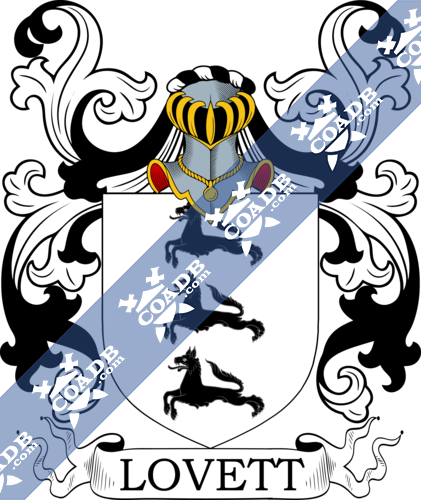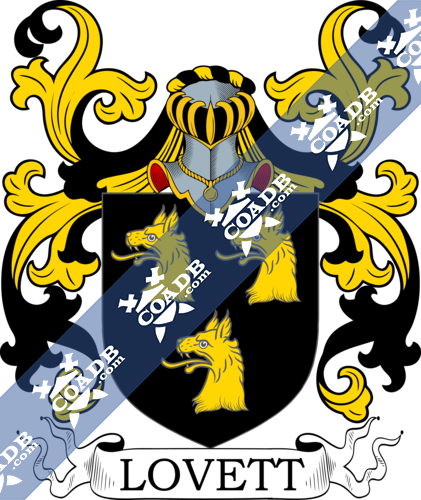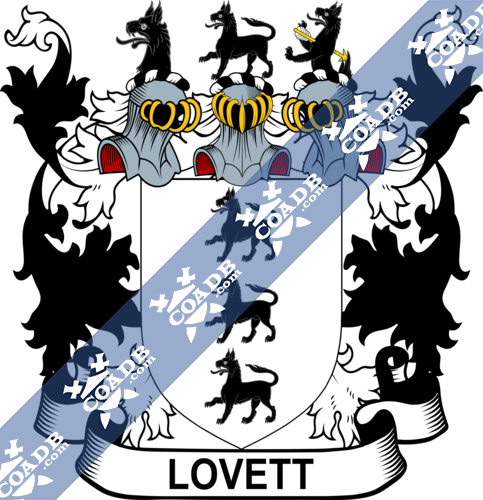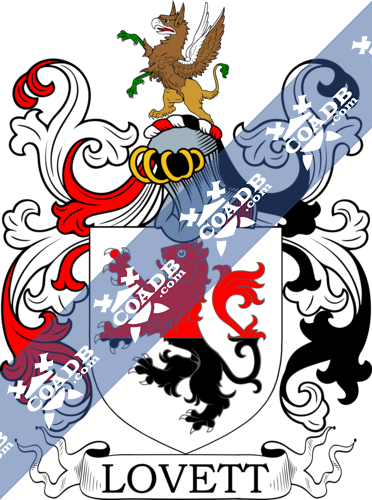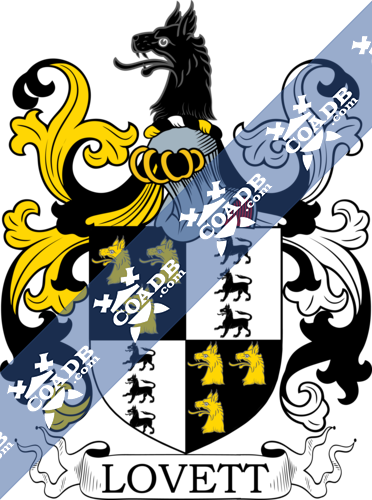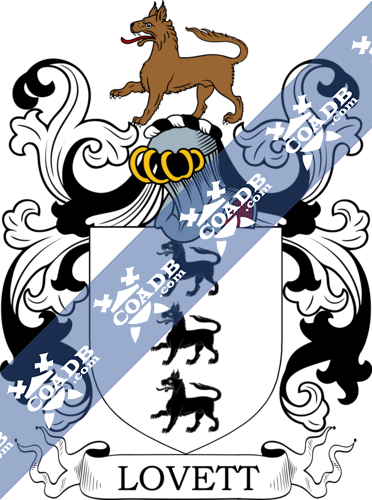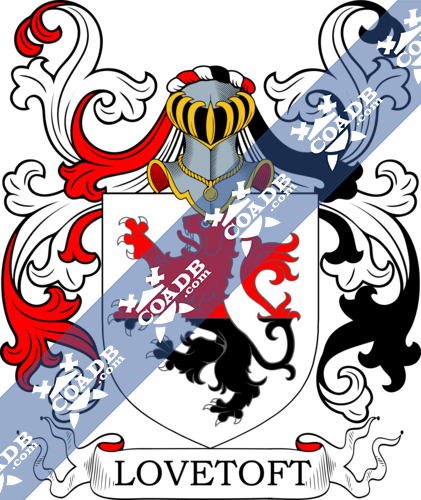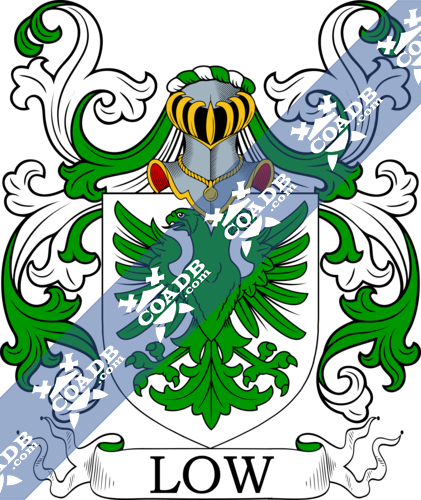Lovett Family Crest, Coat of Arms and Name History
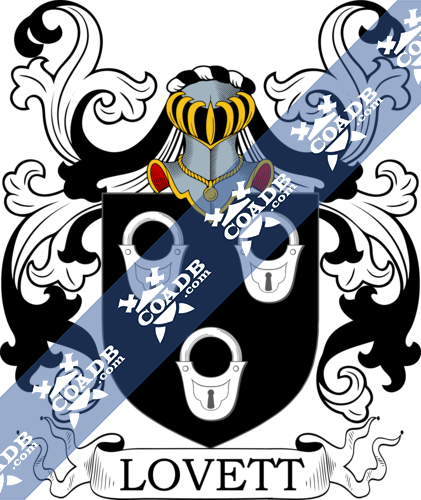
Lovett Coat of Arms Gallery
Don’t know which Coat of Arms is yours?
We can do a genealogical research. Find out the exact history of your family!
Learn MoreLOVETT
The name Lovett is an Anglo-Saxon surname which is believed to have originated from one of two sources. The first, it is believed the name may be Scottish and topographical in origins, possibly a deviation of the name Lovat located near Inverness. Lovat is a compound of two medieval Gaelic words, lobh which translates to “deteriorate” or “rot” and ait which translates to “location”. The second source, suggest the surname Lovat or any variation of its spelling, may be of French Norse origin coming from the word lovet or louvet meaning a “young wolf”.
Surnames in Britain prior to the Norman conquest were largely unheard of. In the small settlements and villages which existed during earlier times, residents found little need for surnames as everyone in these communities new each other and a given name would usually suffice. However, with the passage of time, population growth and expansions of communities as villages gave way to towns and cities, it became necessary to add a qualifier to a people’s names to distinguish them, one from another. Therefore one person may have been identified by their given name plus their occupation while another may have been identified by their given name and one of their parent’s names. The introduction of surnames by the Norman aristocracy after the invasion seemed to be the next logical step in this evolution. There was a boundless supply from which surnames could be formed, in addition to the use of patriarchal/matriarchal names or reference to the individuals occupation, there were things such as defining physical traits, a familiar geographical location or a topographical landmark found near the individuals home or birthplace, the name of the village in which the person lived, and so much more. Soon, surnames would come not just to represent an individual but whole families.
There often exists variations in spelling of many surnames, as with many given names which date back to the early centuries. The variation in spelling of both given and surnames during this time period can be attributed to a lack of continuity regarding guidelines for spelling which was compounded by the diversity of languages in use in European countries at this time. The variations in the spelling of the surname Lovett include but not limited to; Lovett, Lovatt, Lovat, Lovet, Lovett, Lovit, and Lovitt among others.
The earliest record of any variation of this surname is that of Geoffrey Luvet which appears in the Staffordshire tax rolls from 1125. These rolls, were a series of census and tax records kept by the English Treasury by order of King Henry I, with the oldest dating back to the 12th century. They hold the distinction of being the oldest consecutive set of records detailing English governance in the United Kingdom. These records span a period of over 700 years and have proven invaluable to researches over the years. Additional tax rolls show records of Thomas Lovet from Northhamptonshire in 1273 and Willelmus Louott who lived in Yorkshire as of 1379.
The first recorded immigrant to America bearing the surname or any variation of the spelling was Daniel Lovett who arrived in 1630 and settled in Salem, Massachusetts. Robert and Mary Lovett and their daughter Gertrude landed and settled in Virginia in 1635 and Robert Lovett arrived and settled in Virginia in 1635.
There were also many immigrants to the British Common Wealth countries of Canada, Australia, and New Zealand bearing the surname Lovett. Phineas Lovett arrived in 1760 and settled in Nova Scotia, Canada. Captain Daniel Lovett landed in 1784 and settled in New Brunswick, Canada as did Jonathan Lovett. Zacharias Lovett landed in 1856 and settled in Australia. Sarah Lovett arrived in 1860 and settled in Lyttelton, New Zealand. Edward Lovett arrived in 1861 and settled in Auckland, New Zealand. Arthur Lovett arrived in 1863 and settled in Auckland, New Zealand. Charlotte Lovett arrived in 1865 and settled in Auckland, New Zealand.
Worldwide, the highest concentration of people with the surname Lovett are found in Australia, the United Kingdom, Ireland, New Zealand, and the United States . By state, the largest percentile of those with the surname Lovett live in Georgia.
There are many persons of note who bear the surname Lovett. One such notable person was Richard Lovett. Lord Lovett was one of the knights who followed William the Conqueror during the Norman invasion of Britain. He was of Norman nobility and it is documented that in payment for his fealty, Richard Lovett as well as his sons were given land grants in England which the family retained possession of until the 1900s.
Blazons & Genealogy Notes
1) (co. Hants). Same Arms. Crest—A griffin segreant ppr.
2) Sa. three padlocks ar.
3) (Liscombe, co. Bucks, bart., extinct 1812; descended from William Lovett, “filius Ricardi de Louet de Normannia, temp. Conquestoris,” who was appointed Master of the Wolf Hounds, and in consequence, took for his arms ar. three wolves pass. in pale sa. The male heir, Sir Jonathan Lovett, of Liscombe, was created a baronet in 1781, but d. s. p. m., when the title became extinct. The Liscombe estates devolved on Sir Jonathan’s daus. Elizabeth and Letitia, and passed at their decease to their kinsman, Phillips Cosby Lovett, Esq.). Quarterly, 1st and 4th, sa. three wolves’ heads or, for Lovett, of Normandy; 2nd and 3rd, ar. three wolves pass, in pale sa., for Lovett, of England. Crest—A wolf’s head erased sa.
4) (Fun. Ent. Ulster’s Office, 1679, Christopher Lovett, Alderman of Dublin). Ar. three wolves courant in pale sa.
5) (Elmley Lovett, Hampton Lovett, &c., co. Worcester; Sir John Lovett, Lord of Elmley, left two daus. who d. s. p.). Sa. three wolves’ heads erased or.
6) (Belmont, co. Salop). (Fernhill). Ar. three wolves pass, in pale sa. Crest—A wolf pass. ppr.
7) (Codnor, co. Derby, Tavistock, co. Devon, and cos. Essex and Huntingdon). (Astwell, co. Northants; Thomas Lovett, Esq.; his dau. Elizabeth, m. Sir William Chester, Knt., Mayor of London, 1560. Visit. London, 1563). Ar. three wolves pass, in pale sa. Crests—1st: A wolf’s head erased sa.; 2nd: A wolf pass.; 3rd: A demi wolf ramp. sa. pierced through the breast with an arrow or, flighted ar.
8) (Stanton, co. Leicester). Ar. three wolves pass. gu.
9) (co. Derby; descended from Lovet, of Stanton). Same Arms. Crest—A wolf’s head erased sa.
10) (co. Northampton). Quarterly, 1st and 4th, ar. three greyhounds courant sa.; 2nd and 3rd, erm. all within a bordure of the second platee.

